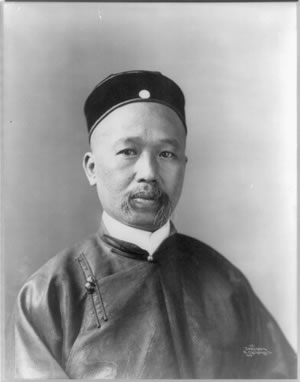19th Century: European Encroachment & the Assault on Traditional Chinese Thought
The Qing dynasty in the 19th century saw the undermining of the prosperity, peace, and stability of earlier times. Qing China was already suffering from an internal economic crisis at the turn of the century, but perhaps even more important to the collapse of the old was the increasingly aggressive encroachment of Europeans in the economic and cultural spheres.
PRELUDE TO THE 19TH CENTURY: JESUIT MISSIONARIES IN CHINA AND THE “RITES CONTROVERSY”
Significant contact between China and Europe began during the latter half of the Ming dynasty (1368-1644). China officially began to trade with the Portuguese in 1557, and soon after, European Jesuits began to establish a presence in Macao and eventually entered China in the early 1580s. The Jesuits were curious about and generally respectful of Chinese culture and customs (including religious rites and Confucianism, in particular), and the imperial governments of the Ming and Qing generally regarded the presence of these Catholic missionaries favorably (though with some significant exceptions) and retained Jesuits as advisers at court. The Qing emperor Kangxi (b. 1654; reign, 1662-1722) even issued an imperial edict in 1692 supporting Chinese converts to Catholicism.
Problems arose, however, when other Catholic orders began to enter China in the 1630s, and an internal controversy developed over whether the Jesuits, in the interest of winning converts, had gone too far in their attempts to make the Catholic faith more compatible with indigenous Chinese beliefs, especially on the question of the veneration of Confucius and the ancestors. The Jesuits insisted that these were civil rites and therefore acceptable practices for Chinese converts to Catholicism. Missionaries of the Dominican and Franciscan orders thought otherwise, and this disagreement (which later came to be known as the “Rites Controversy”) set off a fierce debate amongst European Catholics that would persist for nearly 100 years, from the 1640s to 1742, when Pope Benedict XIV reaffirmed an earlier (1715) decree by Pope Clement XI that sided with the Dominican-Franciscan position. Benedict XIV then declared that this matter was no longer open to debate, effectively closing the book on the issue.
INCREASING EUROPEAN AGGRESSION AND CHINA’S DEFEAT
Following the 1742 degree of Benedict XIV the Qing government regarded Catholics, with the possible exception of some Jesuits who were already favored by the imperial court, with suspicion and strictly contained their activities. Meanwhile the Qing’s economic relationship with Europe did not abate, though here also the Qing made every effort to contain their encroachment. When opium entered the picture in the early 1800s, however, the situation deteriorated significantly for the Qing.
By the mid-1800s, following Qing China’s defeat in the so-called “Opium War” (1840-42) against the British and the resulting Treaty of Nanjing, European soldiers, merchants, and missionaries (both Catholic and Protestant) were establishing a presence in China and moving into cities all along China’s coastline and into interior regions of the country. This influx of Europeans represented an absolute and dramatic threat to China in many ways. The Westerners’ beliefs and customs were vastly different from that of the Chinese, and their ongoing presence represented not only a military disaster but a cultural disaster as well, for it undermined the centrality of the Chinese emperor, as well as the centrality of the Chinese civilization itself.
THE NEW NATIONALISM AND THE REJECTION OF TRADITIONAL BELIEFS
Qing China at the close of the 19th century saw the emergence of a new intellectual elite that increasingly perceived the political situation of the day as proof that the Chinese system did not work and that traditional Chinese beliefs were no longer relevant. China’s physical survival as a nation became the overriding concern of these new intellectuals, for their fear was of not only China’s cultural destruction but China’s political destruction at the hands of imperial powers.
In a desperate urge to strengthen China so that it could resist the ongoing imperialism of the West (and increasingly, of Japan), these Chinese intellectuals developed a new kind of nationalism defined by a dramatic rejection of traditional beliefs, which were seen to have “failed” China. Even the imperial government recognized that some degree of what was called “Western learning” was necessary if China was to survive this new crisis. In 1898, the Qing emperor Guangxu (b. 1871; reign, 1875-1908) appointed Kang Youwei (1858-1927), a leading intellectual of the time, to draft and implement a drastic reform program for the Chinese government. Kang’s program, now known as the “One Hundred Days of Reform,” only had a brief trial period before political pressure brought about a coup and reinstated the Empress Dowager, who favored a more conservative approach.
Kang’s ideas for reform were not abandoned altogether, however, and wide-ranging reforms in education, the military, the economy and the government were implemented throughout the early 1900s, culminating in the elimination of the civil service examination system in 1905. But the reforms could not in the end save the Qing dynasty, which eventually collapsed in 1911. The political vacuum was filled by new anti-imperialist and nationalistic military and intellectual groups that shared an increasingly fierce anti-traditionalism -- a powerful rejection of the very traditional patterns that had guided Chinese life and beliefs during the Qing and earlier periods.
